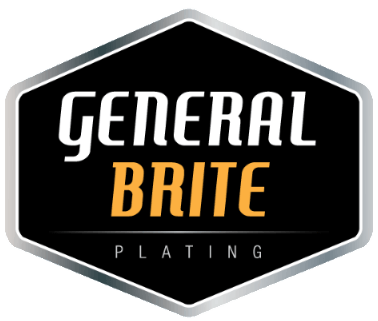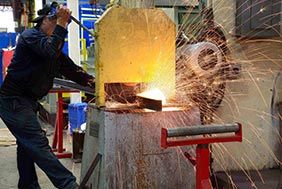PROCESS/ (Metal)
|
APPLICATION SPECIFICATION
|
NORMAL COATING THICKNESS & COLOR
|
REMARKS
|
BAKING (all metals)
(Hydrogen embritflement or stress relief) |
Inaccordance with applicable plating specification |
|
General specifications may require this operation before and /or after processing for hydrogen embrittlement relief, improved adhesion, or hardness, slight staining may result. |
|
BRASS (on all metals) |
|
.0002-.0005
Matte to lustrous |
Normally preceded by bright nickle plate and post treated with a coat of clear lecquer or baked enamel. |
|
BRIGHT DIPS (on aluminum,brass, copper) |
|
Remove Metal |
Clean for welding, pressure test, or spotwelding improves appearance of aluminium, brass and copper after processing. |
|
CHROMIUM (all metal) |
QQ-C-320
- CLASS I - Decorative
- TYPE I - Bright
- TYPE II - Satin
|
CLASS 1 - orative .00001 - .00005 (plus under plate)
CLASS 2 - Engineering .002 unless otherwise specified |
Decorative chrome is normally applied over copper and nickel plate. Hard chrome is plated directly to the basis metal. Parts requiring heavy deposits should be overplated and ground to the finished dimension. |
|
CHROME PICKLE (on magnesium) |
See Dow #1 |
|
|
|
CHROMIC ACID Touch Up (on magnesium) |
See Dow #19 |
|
|
|
COPPER (on all major metals) |
MIL-C-14550 |
- CLASS 0 - .001- .005
- CLASS 1 -.001
- CLASS 2 -.0005
- CLASS 3 - .0002
- CLASS 4 - 0001
|
Stop off for carburizing, shielding for brazing. As an undercoat for other plating, increase electrical conductivity to prevent base metal migration into tin (prevents poisoning solderability). |
|
DEGREASING (on all metals) |
TT-C-490 |
|
Although degreasing will remove oils, grease, etc., it will not always remove solids, additional cleaning may be necessary. |
|
ELECTROLESS NICKLE (on all types of metals) |
MIL-C-26074
- CLASS I-As coated no heat treat
- CLASS II- Metals not adversly affected by heat treat
- CLASS III- Aluminium not heat treatable and beryllium alloys
- CLASS IV- Heat treatable aluminium alloys
|
- GRADE A- .0001 min.
- GRADE B- .0005 min.
- GRADE C- .0015
|
100 percent uniformity of plate thickness on all accesible internal and external areas. Exceptionally good for salvage purpose. Heat treatment at 500'f for one hour, should result in coastings with a Vickers hardness of 850 = 150 for class 2 applications. Note: class 2 coating should be applied to those allcys which would be affected by this heat conditioning. |
|
GOLD on all types of metals |
- TYPE I-99.7% gold
- TYPE II-99.0% gold
- TYPE III-00.9% gold
|
- CLASS OO-.00002
- CLASS 0-.00003
- CLASS 1-.00005
- CLASS 2-.0001
- CLASS 3-.0002
- CLASS 4-.0003
- CLASS 5-.0005
- CLASS 6-.0015
Matle to bright yellow ro orange dependent on thickness and surface finish.
|
Good solderability and corrosion resistence. Normally used over nickel or silver base. Consult military specification for Proper class for intended use. Improve tarnish resistance. |
NICKLE on all metals
(Electodeposited) |
As specified (MIL-F-14072 may be consulted for references)
|
Thickness as specified Colors per FED-STD-595
- GRADE A .0016
- GRADE B .0012
- GRADE C .001
- GRADE D .0008
- GRADE E .0006
- GRADE F .0004
- GRADE G .0002
CLASS 2 as specified
|
There is a nickle finish for almost any need. Nickle can be deposited soft or hard, dull or bright. Corrosion resistance is related to thickness applied. Low co-efficient or thermal expansion. Slightly magnetic. Class 2 plating thickness will be .003 unless otherwise specified, but may be controlled to fit any engineering application.
Note: Class I coating that include copper undercoat are used for decorative chromium systems.
|
|
PAINTING on all metals |
As specified (MIL-F-14072 may be consulted for references)
|
Thickness as specified Colors per FED-STD-595
|
Our facilities include hammertone, wrinkles, enamels, epoxys, urethanes, poly-vinyls, zinc chromate, etc.
|
|
POLISHING on all metals |
|
Removes metal.
Satin to bright
|
Decorative applications. Removes surface imperfections. Bright or satin finishes.
|
|
RHODIUM on all metals |
|
- CLASS 1 - .000002 min.
- CLASS 2 - .00001 min.
- CLASS 3 - .00002 min.
- CLASS 4 - .00010 min.
- CLASS 5 - .00025 min.
|
Excellent abrasion resistance. Good electrical concuctivity. Hard as chromium. Will not tarnish. Excellent wear in contact areas.
|
SANDBLAST on all metals
(Includes Vaporblast, Glass Bead, Liquid Hone) |
|
|
For removing scale and rust, etc., and blending imperfections. Amount of metal removed will depend on media selected. May be used for decorative and optical finishers. Provides uniform matle finish before decorative processing.
|
| *SILK SCREEN PRINTING on all metals |
|
|
An excellent mens to label parts for identification and information.
|
|
SILVER on all metals |
- TYPE I - Matle
- TYPE II - Semi-Bright
- TYPE III - Bright
GRADE A - With supplementary tranish resistant treatment
GRADE B- Without supplementary tranish resistant treatment |
.0005 unless otherwise specified |
Excellent conductivity. Application of light water dip lacquer or chromate treatment per Grade A does not impair solderability. Greatly increases conductivity of lesser metals. An attractive decorative finish, particularly when base metal polished or satined.
|
|
SOLDER PLATE on all metals |
|
.0003 - .0005 unless otherwise specified |
60/40 tin-lead alloy plating. Excellent solderability. Should not be used on part of irregular configuration or with deep recesses. This process is also available for wire and strip.
|
|
TIN (all metal) |
- Type I -Electrodeposited
- Type II- Hot dipped
|
Type I-No thickness is specified. Suggested thicknesses are:
- .0001-.00025 for soldering
- .0002-.0004 to prevent galling or seizing
- .0002-.0006 to prevent formation of case during nitriding
Type II- No thickness is specified. Average will be approximately .0005 Gray to semi-bright
|
Excellent solderability with fair corrosion resistance. Oxides on Type I must be removed before soldering or parts must be protected by lacquer or similar finish immediately after plating. Type I parts may be fused but thickness will vary after treatment. A maximum of .0002 must be maintained to permit satisfactory fusing. Fused tin is not covered in this specification. This process is also available for wire and strip.
|
|
TIN - Bright (on all metals) |
MIL-T-10727
|
.0001-.0005
|
Also known as acid tin plating. Good solderability. Excellent shelf life.
|
|
ZINC (on all metals) |
QQ-Z-325
- Type I- without supplementary chromate treatment
- Type II- with supplementary chromate treatment
- TType III- with supplementary phosphate treatment
|
CLASS 1-.001
CLASS 2- .0005
CLASS 3- .0002 |
Gives galvanic protection to base metal. Untreated (Type I) zinc does not maintain its bright surface for a very long period of time. Weather exposure will change zinc to a dull gray. |




 323-268-6353
323-268-6353









 323-268-6353
323-268-6353